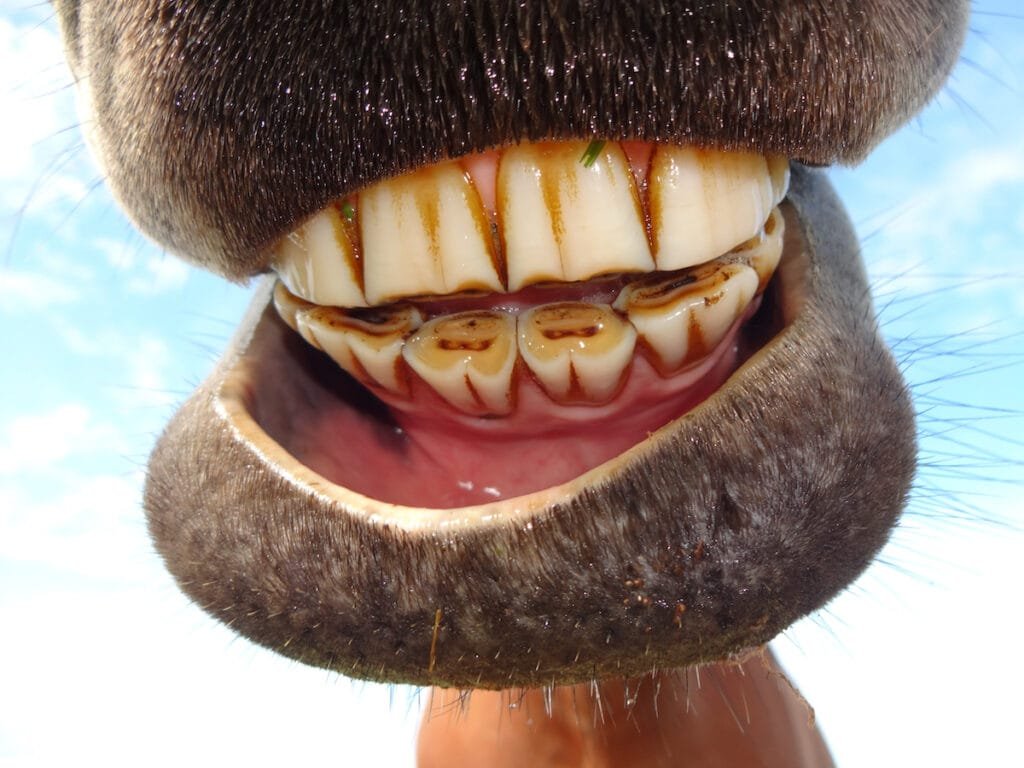As a horse owner, you may have wondered whether you need to clean your horse’s teeth.
After all, horses are naturally wild animals, and their teeth don’t seem to need as much care as ours. So, do horses really need their teeth brushed? In this article, we’ll answer this common question and explain why dental care for your horse is important, what you can do to keep their teeth healthy, and how often you need to care for them.
Why Do Horses Need Dental Care?
Just like people, horses use their teeth to chew food. But unlike humans, horses chew in a repetitive, side-to-side motion, which can wear their teeth unevenly. Over time, this can lead to sharp edges, worn spots, or even painful conditions like infections or tooth loss. A horse’s teeth are continuously growing, which means they need to be filed down naturally as they chew their food. But sometimes, they require extra help to keep them healthy and properly aligned.
Wild horses often roam long distances and eat a varied diet, which naturally keeps their teeth worn down. However, domestic horses usually eat a diet of hay, grains, and other processed foods that may not provide enough natural wear. This is why regular dental care is crucial for domesticated horses. But does that mean brushing their teeth?
Do Horses Need Their Teeth Brushed?
The simple answer is: not exactly. Unlike humans, horses don’t need their teeth brushed with a toothbrush and toothpaste. Instead, they need dental check-ups to ensure that their teeth are in good condition. A professional equine dentist or veterinarian is the one who performs routine dental work on horses. This usually includes floating, a process where a specialist files down the teeth to prevent sharp points and correct any uneven wear. Floating helps ensure that your horse can chew properly and without discomfort.
What Is Floating, and How Often Does It Need to Be Done?
Floating refers to the filing down of a horse’s teeth, typically done with a specialized tool. This procedure helps eliminate sharp points and uneven areas that can cause pain while chewing or even lead to other dental problems. Floating should be done regularly, often once a year, though some horses may need it more frequently, depending on their age, diet, and breed.
Young horses (usually between 2 to 5 years old) often have baby teeth that are replaced by permanent teeth. During this time, dental care is particularly important to ensure that teeth come in properly. Older horses (around 15 years or older) may also need more frequent floating because their teeth wear down less efficiently as they age.
What Are the Signs That Your Horse’s Teeth Need Attention?
While brushing your horse’s teeth is not necessary, it’s important to be aware of any signs that your horse may have dental issues. Here are some signs that their teeth might need attention:
- Difficulty chewing or dropping food: If your horse is having trouble chewing, it may be a sign that their teeth are sharp or misaligned.
- Head tilting or facial swelling: If your horse is tilting their head to one side or has noticeable swelling around the face or jaw, it may indicate a dental issue.
- Bad breath: Foul-smelling breath could be a sign of infection, tooth decay, or gum disease.
- Weight loss: If your horse is losing weight or seems to be eating less, it may be because it’s painful for them to chew properly.
If you notice any of these symptoms, it’s a good idea to have your horse’s teeth checked by a veterinarian or equine dentist.
What About Natural Dental Care for Horses?
Even though brushing isn’t necessary for horses, there are natural ways to help care for their teeth. Providing your horse with a variety of foods that require chewing, such as grass, hay, and root vegetables, can help naturally wear down their teeth. Some horse owners also give their horses dental chews or toys that encourage chewing.
Additionally, ensuring that your horse’s diet is balanced and includes adequate minerals like calcium can support overall dental health. Providing regular access to clean, fresh water is also important for maintaining good dental hygiene.
To sum it up, while horses don’t need their teeth brushed like humans do, regular dental care is still essential to keep your horse’s teeth healthy and comfortable. A professional dental check-up, including floating, is important to ensure that your horse’s teeth are in good condition and are not causing them pain. Keeping an eye out for signs of dental issues and providing a proper diet will also help keep your horse’s teeth in good shape.
So, while brushing might not be necessary, caring for your horse’s teeth is important for their overall health and well-being. If you have any concerns about your horse’s teeth, don’t hesitate to reach out to your veterinarian or equine dentist for advice.




